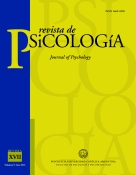Implementación del Modelo de Red Causal en un texto narrativo en español
Palabras clave:
narraciones, Modelo de Red Causal, textos naturalesResumen
El Modelo de Red Causal propone que la estructura causal de una historia y su representación en la memoria episódica se asemejan a una red, en la que los acontecimientos resultan de una combinación de antecedentes causales, que a su vez tienen múltiples consecuencias. El estudio de la comprensión de textos según este modelo ha tendido a llevarse a cabo utilizando textos experimentales en inglés. En razón de ello, el objetivo de este trabajo consistió en presentar la aplicación del Modelo de Red Causal a un texto narrativo natural en español, a fin de abogar por su utilidad para examinar los procesos cognitivos involucrados en la comprensión textual.Descargas
Citas
Barreyro, J. P. & Molinari Marotto, C. (2005). Generación de inferencias repo sitivas y elaborativas en la comprensión de textos narrativos. Anuario de Investigaciones, 12, 221-225.
Bloome, D. (2003). Narrative Discourse. En A. Graesser, Gernsbacher, M. A., S. R. Goldman (eds.), Handbook of Discourse Processes (pp. 287-319). Mahwah, New Jersey: Lawrence Erlbaum Associates.
Bower, G. H., Black, J. B. & Turner, T. J. (1979). Scripts in memory for text. Cognitive Psychology, 11, 177-220.
Graesser, A. C., Magliano, J. P. & Haberlandt, K. (1994). Psychological studies of naturalistic text. En H. van Oostendorp & R. A. Zwaan (eds.), Naturalistic text comprehension (pp. 9-33). Norwood, New Jersey: Ablex.
Kendeou, P. & van den Broek, P. (2005). The effects of readers’ misconceptions on comprehension of scientific text. Journal of Educational Psychology, 97, 235-245.
Kendeou, P. & van den Broek, P. (2007). The effects of prior knowledge and text structure on comprehension processes during reading of scientific texts. Memory & Cognition, 35(7), 1567-1577.
Kintsch, W. (1994). The psychology of discurse processing. En M. A. Gernsbacher (ed.), Handbook of Psycholinguistics, (pp. 721-739). San Diego, California: Academic Press.
Kintsch, W. (1998). Comprehension. A paradigm for cognition. Cambridge: Cambridge University Press.
Klin, C. M. (1995). Causal inference in reading: From immediate activation to longterm memory. Journal of Experimental Psychology: Learning, Memory, and Cognition, 21, 1483-1494.
Mackie, J. L. (1980). The cement of the universe: A study of causation. Oxford: Clarendon Press.
Molinari Marotto, C. (1998). Introducción a los modelos cognitivos de la comprensión del lenguaje. Buenos Aires: Eudeba.
Molinari Marotto, C., Barreyro, J. P. & Yomha Cevasco, J. (2008). El rol de la estructura causal del texto en la generación de inferencias emocionales. Perspectivas en Psicología, 5, 40-49.
Molinari Marotto, C., Barreyro, J. P., Cevasco, J. & van den Broek, P. (2011). �����Generation of Emotional Inferences during the Comprehension of Narrative Texts: Behavioral Data and Implementation through the Landscape Model. Escritos en Psicología, 4, 9-17.
Omanson, R. C. (1982). The relation between centrality and story category variation. Journal of Verbal Learning and Verbal Behavior, 21, 326-337.
Rapp, D. N. & van den Broek, P. (2005). Dynamic text comprehension. Current Directions in Psychological Science, 14, 276-279.
Rapp, D., van den Broek, P. & Kendeou, P. (2005). Integrating memory-based and constructionist processes in accounts of reading comprehension. Discourse Processes, 39, 299-316.
Rumelhart, D. E. (1975). Notes on a schema for stories. En D. G. Bobrow & A. Collins (eds.), Representation and understanding (pp. 211-236). New York: Academic Press.
Stein, N. L. (1982). The definition of a story. Journal of Pragmatics, 6, 487-507.
Suh, S. & Trabasso, T. (1993). Inferences during reading: Converging evidence from discourse analysis, talk-aloud protocols, and recognition priming. Journal of Memory and Language, 32, 279‑300.
Trabasso, T., Secco, T. & van den Broek, P. (1984). Causal cohesion and story cohe rence. En: H. Mandl, N. L. Stein & T. Trabasso (eds.), Learning and comprehension of text (pp. 83-111). Hillsdale, New Jersey: Lawrence Erlbaum.
Trabasso, T. & Sperry, L. L. (1985). Causal relatedness and importance of story events. Journal of Memory and Language, 24, 595-611.
Trabasso, T., van den Broek, P. & Suh, S. Y. (1989). Logical necessity and transitivity of causal relations in stories. Discourse Processes, 12, 1-25.
van den Broek, P. (1990). The causal inference maker: Towards a process model of inference generation in text comprehension. En D. A. Balota, G. B. Flores d’Arcais & K. Rayner (eds.), Comprehension processes in reading (pp. 423-445). Hillsdale, New Jersey: Lawrence Erlbaum.
van den Broek, P. (1994). Comprehension and memory of narrative texts. En M. A. Gernsbacher (ed.), Handbook of psycholinguistics (pp. 539-588). San Diego, California: Academic Press.
van den Broek, P. & Lorch, R. F. (1993). Network representations of causal relations in memory for narrative texts: Evidence from primed recognition. Discourse Processes, 16, 75-98.
van den Broek, P., Risden, K. & Husebye- Hartmann, E. (1995). The role of readers’ standars for coherence in the generation of inferences during reading. En R. F. Lorch, Jr. & E. J. O’Brien (eds.), Sources of coherence in reading. Hillsdale, New Jersey: Lawrence Erlbaum.
van den Broek, P., Rohleder, L. & Narváez, D. (1996). Causal inferences in the comprehension of literary text. En R. J. Kreuz & M. S. MacNealy (eds.), Empirical approaches to literature and aesthetics. Norwood, New Jersey: Ablex Publishing Corporation.
van den Broek, P., Virtue, S., Everson, M., Tzeng, Y. & Sung, Y. C. (2002). Comprehension and memory of science texts: Inferential processes and the construction of a mental representation. En J. Otero, J. A. Leon & A. C. Graesser (Eds.), The psychology of science text comprehension (pp. 131-154). Mahwah, NJ: Lawrence Erlbaum.
Zwaan, R. A. & Singer, M. (2003). Text Comprehension. En A. Graesser, Gernsbacher, M. A., S. R. Goldman (eds.), Handbook of Discourse Processes (pp. 83-121). Mahwah, New Jersey: Lawrence Erlbaum.
Descargas
Publicado
Cómo citar
Número
Sección
Licencia















